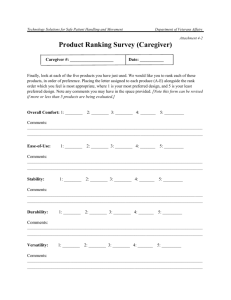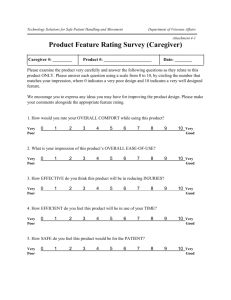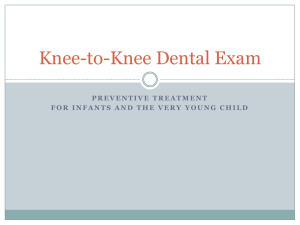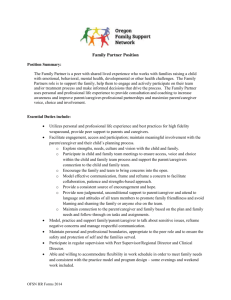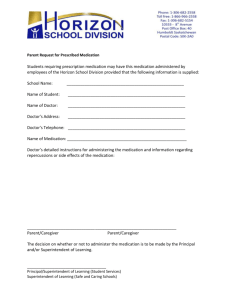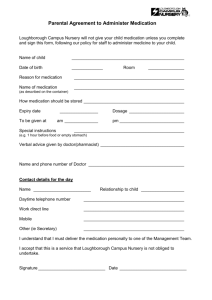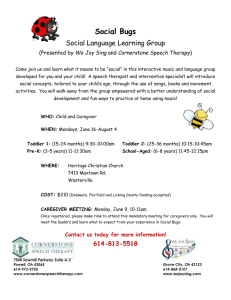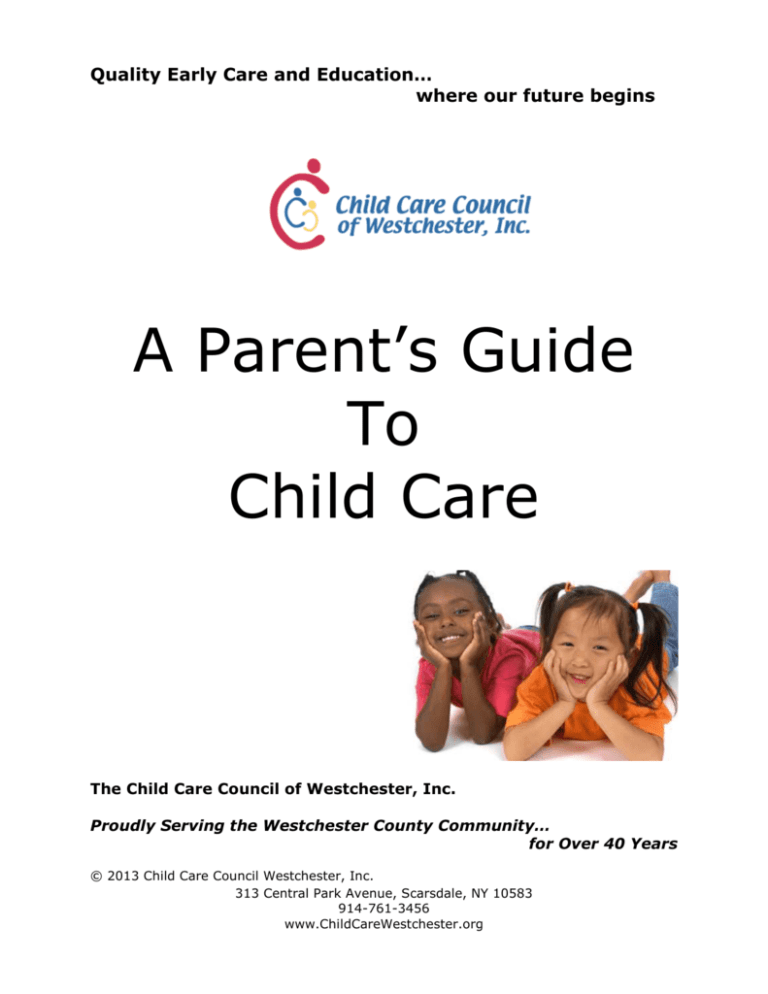
Quality Early Care and Education…
where our future begins
A Parent’s Guide
To
Child Care
The Child Care Council of Westchester, Inc.
Proudly Serving the Westchester County Community…
for Over 40 Years
© 2013 Child Care Council Westchester, Inc.
313 Central Park Avenue, Scarsdale, NY 10583
914-761-3456
www.ChildCareWestchester.org
Table of Contents
Quality Early Care and Education… where our future begins
Page #
About Us
3
Choosing Quality Child Care
4
Where to Begin
4
-
Child Care Options
5
-
Care in Non-residential Settings
6
-
Care in a Provider’s Home
8
-
Care in Your Home
11
-
Other Child Care Options
11
If Your Child Has Special Needs
13
How to Make Your Decision
13
Making Your Final Decision
14
-
Indicators of Quality Child Care
14
-
Taking a Closer Look at Quality
16
-
Danger Signals
18
A Child Care Rating System is Coming to New York
19
Cost of Care/Help Paying for Child Care
19
-
Public Child Care Subsidies
19
-
Tax Credits
20
The Average Cost of Care
20
Complaints or Concerns About a Child Care Program
21
Other Services The Council Offers
21
-
Health Insurance
Starting a Child Care Business
21
21
- Employer Services
Resources
22
22
Child Care Check List
23
Medication and Child Care
25
Child Care Subsidy Resource Sheet
26
Family Provider Capacity Chart
27
Contact us for FREE child care referrals and resources!
Search for child care 24/7 at www.ChildCareWestchester.org
Call a trained child care specialist at 914-761-3456, ext 140.
For financial assistance, dial ext 122.
Monday – Friday, 9AM – 5PM
1-800-898-5114
Page 2 of 28
Quality Early Care and Education… where our future begins
About Us
Mission:
The Child Care Council of Westchester, Inc. champions healthy
development of children, families, and communities by promoting quality
early child care and education.
We accomplish this mission by:
Linking parents and businesses to child care
Implementing quality improvement strategies for child care
Advocating for policies and resources that strengthen child care
Our work benefits the economic health and quality of life of our
communities.
The Child Care Council of Westchester is the only agency in Westchester to offer
coordinated services to all segments of the child care community, including child
care providers, families, companies and corporations, government entities, other
community-based organizations and the general public.
The Child Care Council’s services include the provision of:
regularly updated information on child care programs
early care and education information, and referrals for families of children
and youth
training and technical support to potential and existing early care and
education professionals and programs serving children birth through school
age
facilitating connections for working families to health insurance
parenting and work-life seminars in the community and in the workplace
consultation to help employers address the work-life needs of employees,
including child care and elder care
advocacy and community planning on behalf of children and working families
All information supplied to the Council is kept confidential.
The provider names are intended as referral options only and not recommendations.
The information about the child care providers on our database is supplied by the
providers themselves and has not been verified by the Council. The Council does not
recommend any particular provider nor can we guarantee a provider’s capabilities or the
quality of care. Therefore, inclusion on the database should not be seen as an
endorsement of nor recommendation by the Council. Since selecting a provider is a
subjective decision, you should visit several providers to determine which is best for
your family and decide for yourself if any fulfill your needs
Page 3 of 28
Quality Early Care and Education… where our future begins
Choosing Quality Child Care
Where to Begin…
The Council understands that all families have a variety of needs and interests. We
know that no matter what your individual circumstances are, as a parent, you want
the best for your child. The type of program that you select should be the one that
fits you and your child's individual needs. You know your child's personality best.
Before investigating the vast array of choices, sit back and assess your family’s
needs and priorities. Think about your own child rearing. Consider what’s most
important to you when someone else is caring for your child. Careful and thorough
preparation will save precious time.
Ask Yourself…
How many people in my household have child care responsibility and how
can they participate in this decision?
What hours and days do I need child care?
Will the hours be consistent throughout the year? Do the hours include
weekends? Overnight?
Which holidays and how many vacation days am I able to spend with my
child?
Would I prefer child care near my home or close to my office?
Does my child need transportation?
What are my resources in case of an emergency or illness?
Do I need a program that can administer medication to my child?
How much can I afford to spend?
Tip: Your knowledge and
Is Your Child…
understanding of what’s best
Outgoing? Shy? Independent?
for your family is the most
Able to function well in a group setting?
important ingredient to a
More comfortable in a small group?
successful search.
Able to adjust to a variety of people?
Very active? Creative? What activities does he/she enjoy?
Likely to get sick often?
In need of any special attention or services?
Engaged in any activities that he/she would like to continue such as lessons
or sports?
As a Parent…
What qualities in a caregiver are most important to you?
How important is it that your children are in the same child care setting?
How much contact do you want to have with a caregiver?
What form of discipline, if any, do you think should be used?
How important is the physical setting?
Page 4 of 28
Quality Early Care and Education… where our future begins
What activities would you like to have available to your child?
What are your greatest concerns?
How long do you expect to need child care?
Child Care Options
Choosing appropriate care for your child may be one of the most difficult decisions
you will make as a parent. The child care specialists at the Child Care Council of
Westchester can facilitate your decision-making process by providing you with
detailed information about a wide variety of options. When it comes to selecting
child care, an informed consumer will make a better decision.
Contact us for FREE child care referrals and resources!
Search for child care 24/7 at www.ChildCareWestchester.org
Call a trained child care specialist at 914-761-3456, ext 140.
For financial assistance dial ext 122.
Monday – Friday
9AM – 5PM
Remember…
o
All care provided outside the child’s home which involves more than two
children for more than three hours a day, must be regulated by the State of
New York
o
Regulations specify child/staff ratios, facility size, staff qualifications, and
health, safety and nutritional requirements. Such as:
o child care providers and program staff must go through a state
background check that looks for prior convictions. These programs
also have annual visits from licensing workers and must display their
certificates in a prominent place.
o requires all child care providers to have at least one employee who
holds a valid certificate in cardiopulmonary resuscitation (CPR) and
first aid on the premise of the child care program during the program’s
operating hours
o
Regulations set a basic minimum standard required by law, but may not
meet your personal expectations or standards associated with high quality
care.
Page 5 of 28
Quality Early Care and Education… where our future begins
Which child care plan is right for your family?
Once you understand the options available, you can begin to determine the right
type of child care for your child. A quality child care program will nurture your
child’s development on many levels.
Child Care can be divided into three categories:
Care in a non-residential setting
Care in a provider’s home
Care in your home
Care in Non-residential Settings…
Non-residential settings include child care centers, nursery schools, and school age
child care programs. They may be large or small, accommodate a wide variety of
ages or just infants, toddlers, preschoolers, or school age children. Children will
usually be grouped by age. These programs are formal business institutions,
administered by a private corporation, religious institution, school, community
center, non-profit organization, or private business. They may operate all year long
or just during the school year and may offer part-time, vacation and holiday care.
Child Care Centers
Child Care Centers serve children for more than 3 hours a day and are licensed by
the New York State Office of Children and Family Services. Care may be provided
for children from 6 weeks to 12 years of age. Some programs may have achieved
national accreditation through the National Association for the Education of Young
Children (NAEYC), which indicates they met standards that exceed the minimum
requirements for state licensing.
Many parents prefer child care centers for older children who might benefit from a
more structured environment than is typically found with in-home or family child
care. It is also an option if you want your child to be with peers of the same age.
Since there is a correlation between the education and experience levels of the
director and teaching staff and the quality of child care provided, it is advisable to
inquire about the qualifications of center personnel.
To see the state regulations for child care centers
http://www.ocfs.state.ny.us/main/childcare/daycare_regs.asp
Child Care Centers may care for:
Ages of Children
Adult-To-Child Ratio
Maximum Group Size
6 weeks-18 months
1:4
8
18 months-3 years
1:5
12
3 years
1:7
18
4 years
1:8
21
5 years
1:9
24
5-10 years
1:10
20
10-12 years
1:15
30
Page 6 of 28
Quality Early Care and Education… where our future begins
School Age Child Care Programs
School Age Child Care Programs serve school age children (children 5 to 12 years of
age) outside regular school hours and are registered by the New York State Office
of Children and Family Services. Quality school age care programs provide positive
environments and enriching, developmentally and age appropriate activities. Most
programs run on a school-year calendar, though some also offer vacation, holiday
and summer programs. Some programs may have earned national accreditation
through either the National AfterSchool Association (NAA) or the Council on
Accreditation (COA), which indicates they met standards that exceed the minimum
requirements for state licensing.
Some school age child care programs can care for preschoolers if they have
received a waiver approved by the NYS Office of Children and Family Services. To
ensure programs are allowed to care for preschoolers, ask to see page 2 of their
certificate/registration.
To see the state regulations for school age care
http://www.ocfs.state.ny.us/main/childcare/regs/414_SACC_regs.asp
School Age Child Care Programs may care for:
Ages of Children
Adult-To-Child Ratio
Maximum Group Size
5-10 years
1:10
20
10-12 years
1:15
30
Nursery School Programs
Nursery Schools usually serve children between two years and nine months to 5
years of age, for less than three hours a day. A nursery school program can only
have children in attendance for less than three hours a day in order to be exempt
from child care state licensing/regulations. They often run on a school-year
calendar. Some nursery schools voluntarily register with the New York State
Education Department; this registration would require the nursery school to have at
least two adults available for each group of children at all times. For voluntary
nursery school regulations go to http://www.emsc.nysed.gov/nurseryschool/regulations/
Voluntarily Registered Nursery Schools may care for:
Ages of Children
Adult-To-Child Ratio
3 years
1:8
4 years
1:10
5 years
1:15
Page 7 of 28
Quality Early Care and Education… where our future begins
Care in a Provider’s Home…
Care in a provider’s home offers many of the advantages of child care in your own
home and is usually less expensive. It is normally run by one or two providers. This
arrangement may involve only your child or several others and is most often
referred to as Family Child Care.
Providers are usually able to accommodate parents with difficult work schedules
and often agree to flexible schedules: part-time, weekend, overnight and evening
care. They frequently serve meals from breakfast to dinner, and some providers
pick up children from school.
This may be the best option for you if your child is more comfortable in a home
setting or if you have more than one child and would like them cared for in the
same setting.
The flexibility and informality of this arrangement can be an advantage for some
families and a challenge for others. So, be clear about specifying the hours and
days of service you require. You must also be comfortable with: the number and
age of other children in care (mixed age group), other residents/pets in the home,
and the adult who will provide back-up service in the event the caregiver is unable
to work.
People become family child care providers for many different reasons. It will be
important for you to find out why a caregiver has chosen this kind of work and how
long they intend to continue it.
Remember…
o
In New York State, a provider who cares for three or more unrelated children
for more than three hours a day must be registered or licensed.
o
The New York State Office of Children and Family Services (NYSOCFS) is
responsible for the regulation of child care.
o
A regulated family child care home may be accredited, which means it has
met the standards set by the National Association of Family Child Care
(NAFCC). These standards exceed the requirements of state licensing or
registration.
Page 8 of 28
Quality Early Care and Education… where our future begins
A new law affected on June 16, 2010 allows regulated home-based care to
have more children in care.
HOWEVER, A PROVIDER MUST BE IN COMPLIANCE WITH HIS/HER
CURRENT MAXIMUM CAPAPCITY, NOTED ON THE FACE OF HIS/HER
REGISTRATION OR LICNESE.
PARENTS SHOULD REQUEST TO SEE A PROVIDER’S
REGISTRATION OR LICENSE TO DETERMINE THE PROVIDER’S
MAXIMUM CAPACITY.
There are three types of care in a provider’s home/home-based care
in Westchester County:
Legally Exempt Providers:
A Legally Exempt Provider is one adult caring for no more than 2 unrelated
children in his/her home. They are NOT regulated by the New York State
Office of Children and Family Services.
Family Child Care Providers: (see page 29 for chart)
Usually one caregiver with 6 to 8 children
They are registered by NYSOCFS
To see the state regulations for family child care providers go to
http://www.ocfs.state.ny.us/main/childcare/regs/417_FDC_regs.asp
They may care for:
• children from 6 weeks to 12 years of age
• depending on their certificate up to five or six children, with an
additional 2 school age children (kindergarten age and older).
o Maximum capacity can be 8 children.
• there must be at least one approved caregiver for each 2 children
under two years of age.
o There must be an approved/cleared alternative provider, if there
are more than 2 children under 2 years of age.
Notes:
1. The provider’s own children under kindergarten age are included in these
numbers.
2. If a provider is approved to care for more than two children under two
years old, their registration certificate will indicate, “there must be one
caregiver for every 2 children under two years in attendance”.
3. to confirm if a provider has an approved alternate provider call the child
care council of Westchester at 914-761-3456 ext 115
Page 9 of 28
Quality Early Care and Education… where our future begins
Group Family Child Care Providers: (see page 30 for chart)
Usually two caregivers with 10 to 12 children
They are licensed by NYSOCFS
To see the state regulations for group family child care providers go to
http://www.ocfs.state.ny.us/main/childcare/regs/416_GFDC_regs.asp
They may care for:
• children from 6 weeks to 12 years of age
• depending on their certificate up to ten or twelve children, with an
additional 2 or 4 school age children (kindergarten age and older).
o Maximum capacity can be 16 children.
• one adult for every two children under two years of age
• the provider may care for up to 8 children by his/herself provided that
no more than 2 are under the age of two and at least 2 of the children
are of school age.
Notes:
1. The provider’s own children under kindergarten age are included in
these numbers.
2. If a provider is approved to care for the larger group of children, their
license certificate will indicate “12 children, ages 6 weeks to 12 years
AND 4 additional school-aged children (there must be one caregiver
for every 2 children under two years in attendance)”.
Page 10 of 28
Quality Early Care and Education… where our future begins
Care in Your Home…
This type of care is usually the most flexible and expensive arrangement you can
select. It’s referred to as in-home child care, nanny, babysitter, au pair or mother’s
helper. It may be provided by a caregiver who lives in or out of your home. This
type of care is NOT regulated by the New York State Office of Children and Family
Services.
There are many advantages to this type of care. You alone determine hours of
work, payment and job responsibilities, as well as meal, playtime and activity
schedules. Your sick or disabled children can be cared for in the comfort of their
home where the preferences of your children can be easily accommodated.
This may be the best plan for you if you have more than one child, have an erratic
work schedule, work late or weekend hours, travel a great deal or commute long
distances. However, unless you have a reliable emergency plan, this can be a high
risk arrangement.
Also, you’re considered an employer and required to fulfill a variety of legal
obligations. For information on reporting requirements, contact your accountant or
the IRS at 1-800-829-1040 www.irs.gov.
Remember…
o
There are no child care regulations for this type of care, so you must rely on
your own good judgment, supervision, and research on the caregiver’s
qualifications.
o
Care in your home can be isolating for your child unless play dates and other
activities are arranged.
o
Parents can access an in-home caregiver’s New York State criminal history
information through Kieran’s Law. To request a criminal background check on
a potential caregiver, call (518) 485-7675, the New York State Division of
Criminal Justice Services. For more information on Kieran’s Law go to
http://www.ocfs.state.ny.us/main/publications/pub4628.pdf
Other Child Care Options
All in the Family
Many families choose relatives to provide care for their children. This can be in your
home or a relative’s home. A family member providing care can offer comfort, love,
attention, trust, flexibility and care in a familiar location. However, there can be
challenges. Parents should expect the same level of care from a relative as they
would from an established child care program. Be sure to discuss and clarify your
Page 11 of 28
Quality Early Care and Education… where our future begins
ideas about discipline, safety, daily routine, and if this is a short-term or long-term
agreement.
Summer Day Camps
There are three types of summer programs or day camps for children ranging in
ages from 3 to 13 years. General programs or camps offer a wide array of activities
and a balance between supervised group activities and independent play time.
Specialty camps focus on a particular activity for children with a talent or interest in
a specific field. Clinics are short term and concentrate on one activity (e.g., sports,
drama, art). Some camps offer a Counselor-in-training (C.I.T.) program, for
children 14 to 15 years old, where the camper obtains work experience assisting a
counselor in caring for younger campers.
Day camps are licensed by the
Department of Health.
Head Start
Head Start and Early Head Start are federally funded programs. Head Start
programs are for children ages 2.9 to 5 years of age and Early Head Start programs
are for children 6 weeks to 3 years of age. They provide 3 hours of a free program
and can sometimes offer extended/all day care for a fee. For families who are
eligible, the extended day fee could be covered by Child Care Subsidy. Head Start
programs focus on promoting school readiness for children in low-income families
by providing comprehensive educational, health, nutritional, and social services.
Parents play a large role in the programs, both as primary educators of their
children and as participants in administering the programs locally. It’s open to all
families who meet income eligibility requirements so Head Start/Early Head Start
commonly serves unemployed parents, low income families, foster children,
homeless children, TA recipients, SSI recipients, and children with special needs.
A small percentage of families that are over the eligibility income level can also
enroll their children.
UPK
Universal Pre Kindergarten programs may be offered by the local school districts to
four-year-old children. It provides 2.5 hours of a free program and can sometimes
offer extended/all day care for a fee. These programs are voluntary for both school
districts and children and are regulated by the New York State Department of
Education. School districts may contract with community-based child care centers
and nursery schools to offer UPK.
Shared Care
Shared care usually refers to an agreement made between two families to hire one
caregiver to care for both of the families’ children in one of their homes. Both
families share expenses.
Page 12 of 28
Quality Early Care and Education… where our future begins
If Your Child Has Special Needs
The Americans with Disabilities Act (ADA) guarantees children with disabilities the
opportunity to participate in all activities of community life, including attending child
care. Although child care programs welcome children with disabilities, it doesn’t
mean that all child care settings will work for you. You need to look for a setting
that suits the special needs of your child and a provider with whom you are
comfortable. If your child requires medication while in care, you need to use a
program that is approved to administer medication. Contact the Council to get a
list of programs that are approved to administer medication. For more information
on medication and child care see page 22.
How to Make Your Decision…
Now that you’ve thought about your specific needs and priorities and have had a
chance to consider different child care options, you’re ready to investigate.
#1 Call. First call and verify that the program/provider is potentially good for your
family. Is there an opening for your child? Do the hours and days of operation meet
your needs?
#2 Check their history of violations. Before making a decision on a program or
provider many parents want to know if the program has a history of violations. It’s
not uncommon for programs to have an occasional regulatory violation. However,
serious or regular, on-going violations are reasons for concern and should be
addressed with a program before enrolling your child. You should also regularly
check the program/provider license and violation history. Information about a
provider's regulatory violation history may be obtained by visiting the OCFS
website: go to http://www.ocfs.state.ny.us/ccfs_facilitysearch/
#3 Visit. After you have some basic information, make an appointment to visit
without your child. You’ll want to spend enough time to get to know the caregiver
as well as the program itself. Then if you are considering the program/provider,
make a second appointment with your child. (Go to pages 20-21 for a child care
checklist.)
Center Directors will describe the program, answer your questions and let
you observe the group your child will join. Be sure to become acquainted
with your child’s possible primary caregiver.
Family Child Care providers may ask to meet you after children have left for
the day. If so, be certain to make clear that you will want to return when
children are present before making a decision.
Page 13 of 28
Quality Early Care and Education… where our future begins
In-home caregivers will require at least two interviews. The first will give you
an opportunity to get to know the individual and the second, a chance to see
how the caregiver interacts with your child.
#4 Check references. Ask for references. Speak to at least two parents whose
children are currently in care and ask about their satisfaction as well as your
specific concerns.
Tip: When speaking to a parent for a reference check, a good question to ask to
find out what they do not like about the care is: “Would you change anything about
the program?”
Remember…
o
Trained Child Care Specialists are available to assist you with making your
child care decisions. Call them with your questions or concerns at 914-7613456 ext 140.
o
The referrals provided are not recommendations.
o
No one knows your family as well as you do. What’s good for one family is
not necessarily good for yours.
o
Trust yourself! Your good judgment and instincts are most important. If you
feel you need more preparation, call the Council.
Making Your Final Decision…
Indicators of Quality Child Care
Not all child care is of the quality that really benefits children. There are indicators
that have been proven to affect the quality of care: group size; staff to child ratio;
family involvement; caregivers’ education; turnover rate; health & safety; and
accreditation status. Parents need to consider all these indicators when evaluating
the quality of the care. Child Care Aware, www.childcareaware.org, is a program of
the National Association of Child Care Resources and Referral Agencies (NACCRRA)
and has provided some thoughts on some of these indicators:
Adult to child ratio:
Ask how many children there are for each adult. The fewer the children for each
adult, the better for your child. You want your child to get plenty of attention.
The younger your child, the more important this is. Babies need an adult to child
ratio of no more than 1:4 (one adult for four infants); while four-year-olds can
do well with a ratio of 1:10 (one adult for ten children).
Page 14 of 28
Quality Early Care and Education… where our future begins
Group size:
Find out how many children are in the group. The smaller the group, the better.
Imagine a group of 25 two-year olds with five adults, compared to a group of 10
with two adults. Both groups have the same adult to child ratio. Which would be
calmer and safer? Which would be more like a family?
Caregiver qualifications:
Ask about the caregivers' training and education. Caregivers with degrees
and/or special training in working with children will be better able to help your
child learn. Are the caregivers involved in activities to improve their skills? Do
they attend classes and workshops?
Turnover:
Check how long caregivers have been at the center or providing care in their
homes. It's best if children stay with the same caregiver at least a year.
Caregivers who come and go make it hard on your child. Getting used to new
caregivers takes time and energy that could be spent on learning new things.
Accreditation:
Find out if the child care provider has been accredited by a national
organization. Providers that are accredited have met voluntary standards for
child care that are higher than most state licensing requirements. The National
Association for the Education of Young Children (NAEYC) and The National
Association for Family Child Care (NAFCC) are the two largest organizations that
accredit child care programs.
© NACCRRA 2010 - The National Association of Child Care Resource & Referral Agencies - All rights
reserved 3101 Wilson Boulevard, Suite 350, Arlington, VA 22201
GO TO PAGES 20-21
for a Child Care Checklist!
Tip: Remember you as a
parent are the best judge as
to which provider or center
will be the most appropriate in
meeting your child’s needs, as
well as your own.
Visit our website,
www.ChildCareWestchester.org,
for specific information on
Infant & Toddler Care
Page 15 of 28
Quality Early Care and Education… where our future begins
Taking a Closer Look at Quality
The Child Care Provider/Staff Person
Does the provider/staff person....
• appear to be warm and friendly?
• seem to enjoy his or her job?
• show respect for colleagues?
• display a calm and gentle demeanor?
• get down to the child’s level?
What
•
•
•
•
•
are the provider/staff person’s beliefs regarding...
praise and discipline?
treating children as individuals?
allowing children to learn and experience at their own pace?
sharing diverse family and cultural values?
toilet training?
Does
•
•
•
•
the provider/staff person.....
offer individual attention to each child?
teach children to respect themselves and others?
share information with parents?
maintain confidentiality regarding family information?
Other questions you may wish to ask....
• How much experience does the child care provider/staff person have
working with young children or with children of your child’s age?
• How does the provider or staff person continue their professional
training?
The Program
Does the program offer...
• a written curriculum?
• daily or weekly activities that will help children learn?
• age-appropriate materials that are accessible to the children?
• quality books that are culturally diverse?
• manipulative toys such as blocks and puzzles?
• creative materials such as crayons, paint, paper, and paste?
• riding toys, climbing structures, pull toys and balls?
• space for running, jumping and quiet time?
• grown-up clothes, household items, and dolls for dramatic play?
• music activities such as singing, dancing, and simple instruments?
• toys that are culturally sensitive?
• opportunities to explore nature?
Page 16 of 28
Quality Early Care and Education… where our future begins
•
•
•
•
•
•
•
time for individual and small-group play?
a balance between outdoor play and indoor activities?
field trips to parks, the library and other places of interest?
nutritious meals and snacks served at appropriate times?
opportunities for children to help with meal preparation and cleanup?
opportunities for parents to observe and participate?
links to other community resources?
Health and Safety
There are some general health and safety components that you should look
for:
• staff who are state certified to administer medication
• clean and comfortable play areas
• well-maintained equipment, toys and games
• a hazard-free outdoor play area
• adequate heat, light, and ventilation
• clean bathroom facilities
• proper storage of toxic materials and medications
• a detailed plan for emergencies
• emergency numbers by the telephone
• at least one staff member trained in First Aid and CPR
• working smoke detectors installed in appropriate locations
• alternate exits that are remote from each other
• safety caps on electrical outlets
• a sanitary diaper changing station
• a hand-washing policy for food handling and diaper changing
• one cot/crib per child for nap time
• procedures/facilities for handling a sick child
• proper storage for each child’s belongings
• a current registration certificate or license
• proper child/staff ratio so children are well supervised at all times
• infants sleeping on their backs
Registration
When enrolling your child in a program, ask.....
• if unannounced visits by parents are encouraged?
• is the program accredited?
• is there a written contract?
• what fees are you expected to pay, and when are they due?
• what are the provider’s or center’s scheduled hours and holidays?
• how emergencies and parent notification are handled?
• if transportation vehicles have appropriate car restraints?
• how special dietary needs are accommodated?
• will they supply their tax ID number? (Be sure to have this information
when care begins.)
Also, ask if there are policies regarding.....
• overtime and late fees?
Page 17 of 28
Quality Early Care and Education… where our future begins
• payment when your child is absent due to illness, vacation or holidays?
• discipline, toilet training and toileting accidents?
• substitute providers/staff members when necessary?
Be prepared to provide.....
• your full name, address and day/evening telephone numbers
• two emergency contacts in case you cannot be reached
• the names of any persons who have permission to pick up your child
• specific information regarding your child, such as food preferences,
habits, allergies and medical needs
• written permission to provide emergency medical treatment for your
child
• a copy of your child’s current medical record with up-to-date
immunizations
Danger Signals
You should rule out any child care when the provider or center staff:
• do not want you to visit
• do not welcome questions about the program
• do not appear to care about or respond to the children
• sound angry, cross or overwhelmed when dealing with the children
• are verbally abusive or physically rough with the children
• seem inattentive and uninvolved with the children
Additional danger signals include:
• the home or center appears dirty and/or unsafe
• more than the legally allowed number of children are present
• excessive use of television, playpens or walkers
• observing a series of unrelated adults in the setting
A few final thoughts....
Be sure to visit more than one
program or provider.
The Number One Thing to
remember when choosing child
care is....
TRUST YOUR INTUITION!
Page 18 of 28
Quality Early Care and Education… where our future begins
A Child Care Rating System is Coming to New York
New York State is in the beginning stages of developing QUALITYstarsNY, a NYS
quality rating and improvement system. It is a voluntary program to rate, improve
and communicate levels of quality in all regulated early care and learning programs.
Participating child care programs will earn one to five stars based on ratings in four
categories:
Learning Environment; Family Engagement; Qualifications and
Experience; and Leadership and Management. For information on the process and
progress of QUALITYstarsNY, go to www.qualitystarsny.org.
Cost of Care / Help Paying For Child Care
Many families need help paying for the high cost of child care. Some families spend
half of their income to place their child in a quality child care program. Although
fees vary greatly, you should expect to spend anywhere from 10% to 35% of your
gross income on child care. Financial assistance is available on several levels.
There is the public Child Care Subsidy Program administered by the Westchester
County Department of Social Services, private scholarships, tax credits, dependent
care assistance programs and employer assistance programs. Some child care
programs offer private scholarships, sliding fee scales, or are willing to negotiate
their fees. Visit our website at www.ChildCareWestchester.org for information and
eligibility on the financial assistance available to your family.
Public Child Care Subsidies
Many low income working families are eligible for assistance to pay for child care
through the Child Care Subsidy Program. The Council provides Subsidy Support
Services to help you understand eligibility, complete an application, understand
how the program works and if accepted, recertify.
If you are currently receiving or are applying for child care subsidy through the
Westchester County Department of Social Services (DSS), be aware that there are
two subsidy eligibility classifications: Low Income and Title XX. There could be
some limitations on the type of care you use. See page 23 for more details.
To see if you qualify for public subsidy funds call the Council’s Subsidy
Support Services at (914) 761-3456 ext. 122.
Page 19 of 28
Quality Early Care and Education… where our future begins
Tax Credits
Families may also qualify for various tax credits that can help them financially. To
see if you qualify try our Benefits Calculator at www.ChildCareWestchester.org
under Help Paying for Child Care.
The Average Cost of Care
Each year, the Council updates the information on all the child care providers and
programs in our referral database. Many of them supply us with their fees for care.
This information is used to compute the average cost of child care.
Average Cost of Care
Child Care Centers
Infants (6 Weeks - 18 Months)
Toddlers (19 Months - 35 Months)
Preschoolers (3-5 years old)
School Age (5-12years old)
Hourly Part Time School Age (5-12years old)
Family/Group Family Child Care Providers
Infants (6 Weeks - 23 Months)
Toddlers (24 Months - 35 Months)
Preschoolers (3-5 years old)
School Age (5-12years old)
Hourly Part Time School Age (5-12years old)
School Age Programs
Weekly Part Time School Age (5-12years old)*
Hourly Part Time School Age (5-12years old)
Full Time Weekly Rate
Range
Average
$250 - $427
$213 - $406
$195 - $375
$240 - $250
$7 - $10
$316
$287
$263
$245
$8
$125 - $468
$90 - $425
$85 - $425
$95 - $375
$4 - $20
$260
$242
$233
$223
$9
$15- $450
$5 - $10
$116
$8
* These are part time weekly rates, which could include before and after school rates.
Page 20 of 28
Quality Early Care and Education… where our future begins
Complaints or Concerns About a Child Care Program:
If you have concerns or want to make a complaint about a child care program call
the Council and a staff person will take the information. If you think a program is
operating without the proper license or registration certificate, this is also the basis
for making a complaint.
To make a complaint call the Council at: (914) 761-3456 and press “0” to be
connected to the operator. You will be transferred to someone who can speak to
you directly.
Even after your child has started the program a problem may exist if your child
suddenly seems unhappy, is not eating or sleeping well, or loses enthusiasm for
playing with you, other children or his/her toys. To ensure that your child is
receiving the level of care you want, make unannounced visits.
The New York State Office of Children and Family Services maintains a
state-wide toll-free line at 1-800-732-5207 for complaints of possible
regulatory violations in a child care program. If the complaint involves
imminent danger, child abuse, or neglect, call 1-800-342-3720.
Other Services The Council Offers:
Health Insurance
The Council provides one-on-one assistance to families who may be eligible for free
or low-cost health insurance. Medicaid and Child Health Plus is a health insurance
plan for uninsured children under 19 years of age regardless of income or
immigration status. Family Health Plus is a health insurance plan for uninsured,
low-income adults between the ages of 19 and 64 who are not eligible for Medicaid
and have no other health insurance. Call us at (914) 761-3456, ext. 136 or 122
for more information. This is a project of the Westchester County Department of
Health funded by the New York State Department of Health.
Starting a Child Care Business
The Council can help you get started! To discuss a career in family child care or to
open a child care center or school age program, please visit our website at
www.ChildCareWestchester.org or call the Council at 914-761-3456.
Page 21 of 28
Quality Early Care and Education… where our future begins
Employer Services
In an effort to retain valuable employees, companies need to create family-friendly
work environments and benefits. The Council can assist companies with
establishing a work-life balance by providing enhanced child care referrals, on-site
seminars, and assist with on-site and near-site child care center start up. To
customize a program based on a company’s needs, call (914) 761-3456, ext.
139.
Resources:
For additional community or family resources:
o visit
our
Parent
Connections
section
on
our
website
at
www.ChildCareWestchester.orgfor recent parent e-newsletters, parent
group and training information, and local resources.
o Call 211 Hudson Valley Region United Way helpline. It’s a resource that
people can call about everything from basic needs like food, clothing and
shelter, to volunteer opportunities, legal services, drug treatment,
employment support, child care, elder care and more. (If calling from outside
the Hudson Valley area/Westchester County call 1-800-899-1479 or 914997-6700 ext 748)
Contact us for FREE child care referrals and resources!
Search for child care 24/7 at www.ChildCareWestchester.org
Call a trained child care specialist at 914-761-3456, ext 140.
For financial assistance dial ext 122.
Monday – Friday
9AM – 5PM
Thanks to the Child Care Council of Nassau, Inc for use of their resources.
Page 22 of 28
Quality Early Care and Education… where our future begins
Is This the Right Place for My Child?*
Place a check in the box if the program meets your expectations
Will my child be supervised?
Notes
Are children watched at all times, including when they are sleeping?
Are adults warm and welcoming? Do they pay individual attention to each child?
Are positive guidance techniques used?* Adults should never yell, spank, or use other
**
negative punishments.
Are the caregiver/teacher-to-child ratios appropriate and do they follow the recommended
***
guidelines:
One caregiver per 3 or 4 infants
One caregiver per 3 or 4 young toddlers
One caregiver per 4 to 6 older toddlers
One caregiver per 6 to 9 preschoolers
Have the adults been trained to care for children?
Notes
If a center,
Does the director have a degree and some experience in caring for children?
Do the teachers have a credential or associate’s degree and experience in caring for
children?
If a family child care home,
Has the provider had specific training on children’s development and experience caring
for children?
Is there always someone present who has current CPR and first aid training?
Are the adults continuing to receive training on caring for children?
Have the adults been trained on child abuse prevention and how to report suspected cases?
Will my child be able to grow and learn?
Notes
For older children, are there specific areas for different kinds of play (books, blocks, puzzles,
art, etc.)?
For infants and toddlers, are there toys that “do something” when the child plays with them?
Is the play space organized and are materials easy-to-use? Are some materials available at
all times?
Are there daily or weekly activity plans available? Have the adults planned experiences for
the children to enjoy? Will the activities help children learn?
Do the adults talk with the children throughout the day? Do they engage them in
conversations? Ask questions when appropriate?
Do the adults read to children at least twice a day or encourage them to read, if they can
read?
Is this a safe and healthy place for my child?
Notes
Are there clear policies and procedures for infection control (hand washing, diaper changing,
sanitation schedule of toys and equipment, and use of gloves)?
Do adults and children wash their hands (after using the bathroom, changing diapers, eating,
etc.)?
Are diaper changing surfaces cleaned and disinfected after each use?
Do all of the children enrolled have the required immunizations?
Are medicines labeled and out of children’s reach?
Is the program approved to administer medication?** Are adults trained to give medicines
and keep records of medications?*
Are cleaning supplies and other poisonous materials locked up, out of children’s reach?
Is there a plan to follow if a child is injured, sick or lost?
Are first aid kits readily available?
Is there a plan for responding to disasters (fire, flood, etc.)?
Is the outdoor play area a safe place for children to play?
Page 23 of 28
Quality Early Care and Education… where our future begins
Is it checked each morning for hazards before children use it?
Is the equipment the right size and type for the age of the children who use it?
In center-based programs, is the playground area surrounded by a fence at least 4 feet
tall?
Is the equipment placed on mulch, sand, or rubber matting?
Is the equipment in good condition?
Is the program/provider within NYS Regulated ratios and maximum group size?
If a center,
Age Group
Child/Adult ratio
6 weeks-18 months
4:1
18 months to 3 years
5:1
3 years
7:1
4 years
8:1
5years
9:1
5-9 years
10:1
10-12 years
15:1
**
Maximum Group Size
8
12
18
21
24
20
30
If a family child care home,
Registered Providers: Can care for children 6weeks to 12 years old.
Either:
•
Up to 6 children, if all are over the age of two or Up to 5 children, if any child is
under the age of two; And up to 2 additional school age children, if approved. With
no more than 2 children under the age of two.
OR (If approved can follow new regulations as of June 2010)
•
Up to 6 children and up to 2 additional school age children, if approved. One
approved caregiver per every 2 children under the age of two!
Group/Licensed Providers: Can care for children 6weeks to 12 years old.
Either:
•
Up to 12 children, if all are over the age of two OR Up to 10 children, if any child is
under the age of two; And up to 2 additional school age children, if approved. With
2 adults for every 2 children under the age of two.
OR (If approved can follow new regulations as of June 2010)
•
Up to 12 children and up to 4 additional school age children, if approved. One
approved caregiver per every 2 children under the age of two!
Is the program well-managed?
Notes
Does the program have the highest level of licensing offered by the state?
Are there written personnel policies and job descriptions?
Are parents and staff asked to evaluate the program?
Are staff evaluated each year; do providers do a self-assessment?
Is there a written annual training plan for staff professional development?
Is the program evaluated each year by someone outside the program?
Is the program accredited by a national organization?
Does the program work with parents?
Notes
Will I be welcome any time my child is in care?
Is parents’ feedback sought and used in making program improvements?
Will I be given a copy of the program’s policies?
Are annual conferences held with parents?
* NACCRRA’s, Is This the Right Place for My child? 38 Research-Based Indicators of High-Quality Child-Care, www.naccrra.org.
** Child Care Council of Westchester, Inc. www.ChildCareWestchester.org
*** These are the adult-to-child ratios and group sizes recommended by the National Association for the Education of Young Children. Ratios are lowered when there
are one or more children who may need additional help to fully participate in a program due to a disability, or other factors.
Page 24 of 28
Quality Early Care and Education… where our future begins
Attention Parents: Medication and Child Care
Will your child need medication during his or her time in child care?
Tylenol? Motrin? Antibiotics?
All regulated child care centers, family child care homes and school age programs must
be approved to administer medication to children in their care.
In choosing a program for your child please ask yourself:
• Do you want your child to be able to receive medication like Tylenol when they
develop a fever while in care?
• Does your child occasionally require an antibiotic that might need to be given while
in care?
• Does your child have allergies that might require the use of an EpiPen while in care?
• Does your child have asthma that might require use of an inhaler while in care?
• Does your child take medication on an on-going basis that would need to be given
while in care?
If the answer to any of these questions is YES, you’ll need to find a child care program
that is approved to administer medication.
Not all programs or providers are approved to administer medications. There are
programs that have an approved Waiver: Administration of Emergency
Medication. The waiver is used to only allow the administration of life-saving
medications (EpiPen, nebulizers, and asthma inhalers) when a child is experiencing a
severe allergic reaction (anaphylactic shock) or life-threatening asthma. These
programs are not required to take the Medication Administration Training Course and
must follow specific terms of the waiver.
Ask to see the program’s registration or license. This will indicate if they are allowed to
administer medications.
What should parents do?
Ask your current or potential provider if they are approved to administer medication. If
the answer is no and your child may require medicine during his/her time in care, this
program may not be right for you.
However, there are other ways to work with a program that is not approved to
administer medication. You or a family member can go to the child care program to
administer the medication to your child or your pediatrician may be able to adjust the
medication so that it can be given before and/or after care.
Please note that there are circumstances where compliance with the Americans with
Disabilities Act may require a child care provider to become approved to administer
medications to care for a child with a disability.
For information on which programs can administering medication call the
Child Care Council of Westchester 914–761-3456 ext. 140
Page 25 of 28
Quality Early Care and Education… where our future begins
Child Care Subsidy Resource Sheet
Low Income Child Care
If you fall below these income levels, you may be eligible for Child Care Subsidy.
You can use anyone who is legally able to care for your child, which includes all the
referrals received from the Council’s Referral Department.
Income Levels for Low Income Child Care Subsidy
Effective 6/1/12 - 5/31/13
Family Size
Is Your Household Income
Below?
2
$30,260.00
3
$38,180.00
4
$46,010.00
5
$54,020.00
Title XX Child Care
Title XX Child Care Subsidy was available for families earning above low income
child care levels prior to April 2010. As of April 1, 2010, no new applications for
these funds will be approved. Families can still apply to determine eligibility.
However, if determined eligible you will not receive assistance to pay for child care
but will be notified that you are being denied subsidy due to lack of funding and
their names will be placed on a mailing list.
Current recipients of the Title XX Child Care Subsidy will retain their child care
assistance as long as they remain programmatically and financially eligible. Due to
all the changes in subsidy, it is important that current recipients should be sure to
be timely with all requirements to keep their case open.
Our Subsidy Coordinator can
help you obtain funds to pay
for child care through child
care
subsidy.
She
provides
support
with
completing
an
application and understanding if
you are eligible. Call her with all
your questions about the subsidy
system at 914-761-3456 ext 122.
Page 26 of 28
Quality Early Care and Education… where our future begins
Family Child Care
Family child care
providers may care
for up to 6 children
One approved caregiver
per every 2 children
under the age of two!
And up to 2 additional
school age children,
if approved.
For a maximum capacity of 8 children
Family child care providers may care for
more than 2 children under the age of two
only if:
There is at least one
approved caregiver
for each 2 children
under the age of
two.
Page 27 of 28
Quality Early Care and Education… where our future begins
Group Family
Child Care
Group family child
care providers
may care for
up to 12 children
One approved caregiver per
every 2 children under the
age of two!
(For example, 6 children
under two require three
approved caregivers)
and up to 4
additional school
age children,
if approved.
For a maximum capacity of 16 children
One group family child care providers
may care for up to 8 children by his/herself provided that:
No More than 2 children are
under the age of two
and at least 2 of the children
are of school age.
Page 28 of 28

